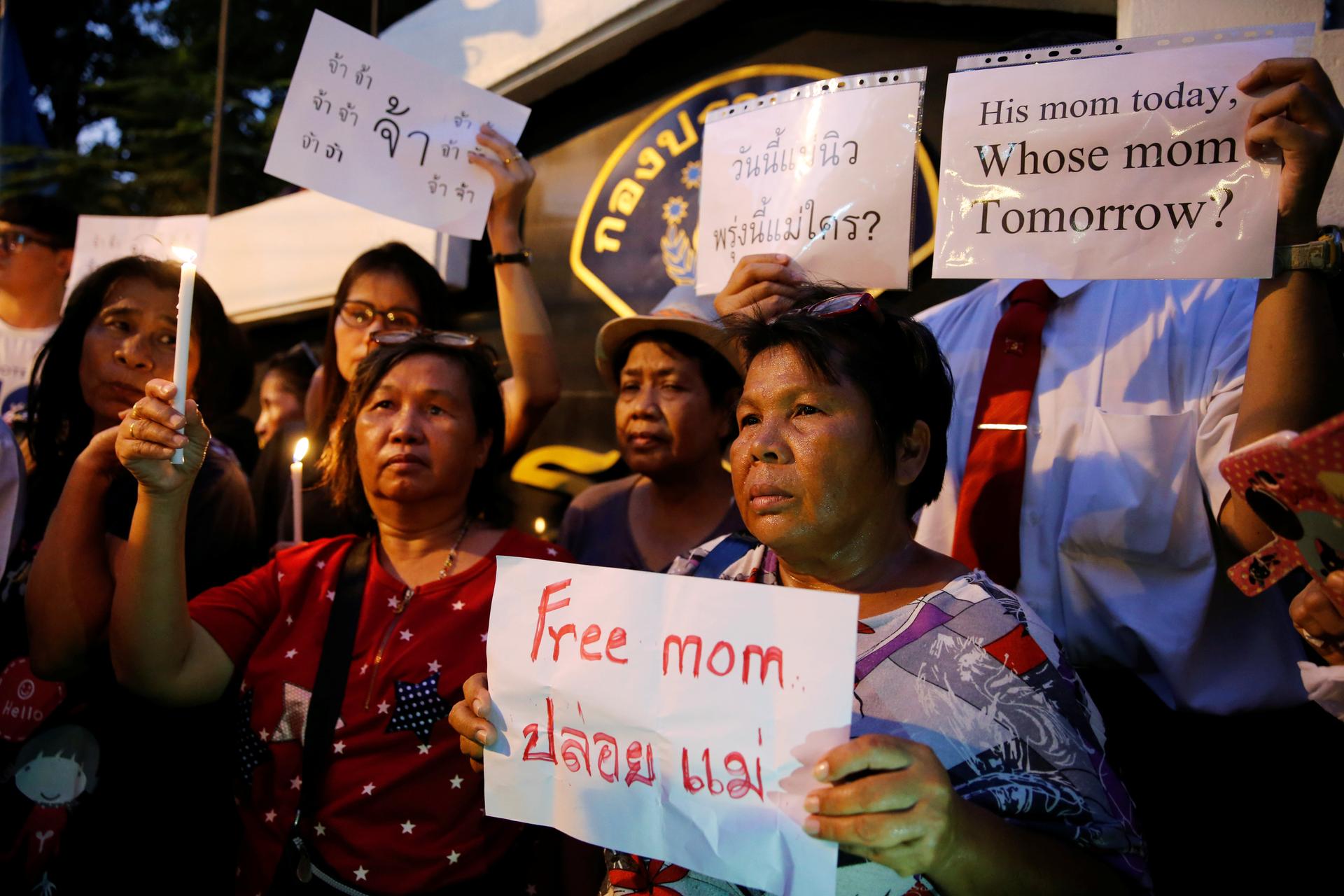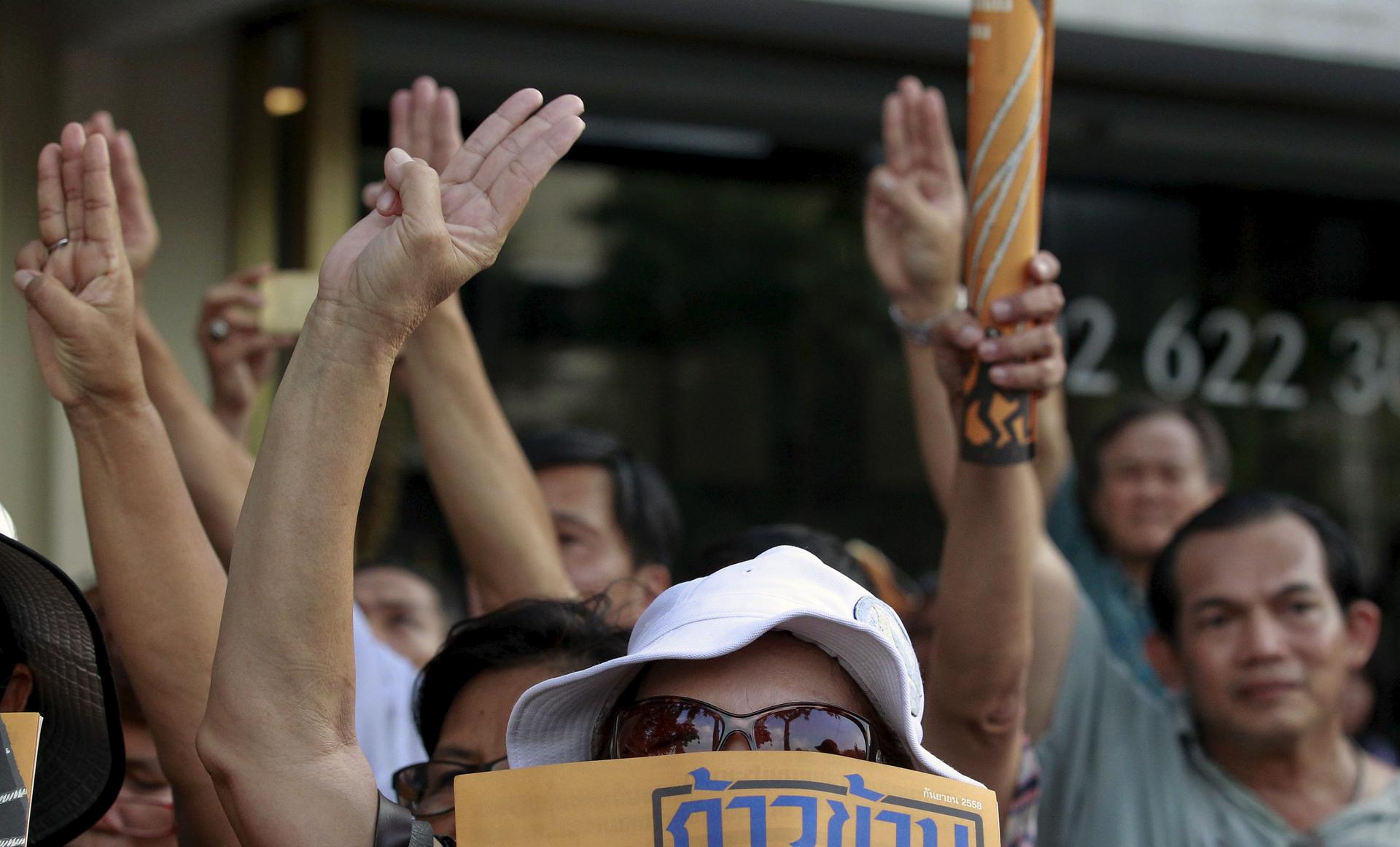Thailand’s thoughtcrime arrests are getting dangerously bizarre
Demonstrators from the New Democracy Movement (NDM) group flash the three-finger salute inspired by the movie "The Hunger Games" during a rally at the Democracy Monument in Bangkok, Thailand, Sept. 19, 2015. Hundreds of activists defied a ban on protests and marched in Thailand's capital in a rare rally against the hard-line ruling military.
In the eyes of Thailand’s military rulers, it seems no subversive thought is too petty to punish.
Thailand is now entering its third year under military dictatorship, a reign established when generals seized power from an elected government on May 22, 2014.
The army has vowed to use its sweeping powers to heal a nation torn by class resentment. But its favored tactics for keeping the peace — locking up critics and silencing dissent — have turned Thailand into a nation where even meek expressions of defiance can end in detention.
In the past nine months, Thais have been charged for clicking “like” on subversive Facebook memes. For handing flowers to an anti-junta activist. For allegedly insulting the king’s pet dog.
Others have been detained simply for reading George Orwell’s “1984” in public, or for raising three fingers, an anti-tyranny salute from the “Hunger Games” films.
Officers have even snatched up a man for eating a sandwich.
It was no ordinary sandwich, mind you. It was publicly declared a “sandwich for democracy,” scarfed down by an anti-junta activist at a mall — all while reading 1984. He was quickly surrounded by plainclothes officers.
“I am not a very brave person so, yes, I got kind of nervous and my hands were shaking,” said the dissident sandwich eater, a 33-year-old nicknamed Champ. (He requested that his full name be omitted.)
“As Che Guevara said, if you tremble at the sign of injustice, you are a friend of mine.”
This stunt, staged shortly after the coup, was a cheeky attempt to evade laws forbidding traditional political rallies. But its deeper intent was to reveal how far military officers would go to attack critics. They did not disappoint.
After taking a few nibbles, Champ was grabbed by six agents and hauled off by the seat of his pants.
“They dragged me away. They slapped my head,” Champ said in an interview this month. “They just kept punching me until they were sure that I couldn’t escape.”
Once subdued, Champ was taken to an army facility and interrogated. “They told me I’m a betrayer of my country,” he said. “They kept saying there’s been a lot of fighting in Thailand … and that we shouldn’t disrupt the peace.”
But the ordeal was worth it, Champ said. After all, it proved from the outset that the army “would not tolerate any kind of protest, any challenge to their rule, any little thing, including sandwich eating.”
“In the end,” he said, “they just made a fool of themselves.”
When the army seized power two years ago, it justified its takeover by promising a wave of grand reforms. Thailand, the generals said, would become a nation purged of corruption and of the recurring, sometimes bloody street protests that have convulsed the political order for nearly a decade.
Army chief Prayuth Chan-ocha, who appointed himself prime minister, even released a syrupy ballad vowing to “return happiness to the people.” At the outset, his subordinates seemed similarly upbeat.
“Of course, we are very experienced in terms of intervention. Anyone want to argue with me?” said Major General Werachon Sukondhapatipak, a military spokesman, at a press conference shortly after the 2014 coup.
“This is the 13th, coup number 13,” he said. “A lucky number!”
Indeed, Thailand has endured 13 successful coups since 1932, the last year in which the nation (then called Siam) was directly ruled by monarchs.
“The United States has the Patriot Act to deal with the situation after 9/11,” Gen. Werachon said. “This is the same.”
But for those who’ve run afoul of the junta, the latest coup has not brought much luck. Since the takeover, according to Human Rights Watch, at least 1,300 people have been summoned for questioning or what the army calls “attitude adjustment.”
This can involve several days of interrogation and re-education at an army camp. Failure to attend is a crime. “The United States has the Patriot Act to deal with the situation after 9/11,” Gen. Werachon said. “This is the same.”
Even less fortunate are those accused of Thailand’s most serious speech-related crime: disrespecting the royal family. The army, closely aligned with the palace, considers “upholding the monarchy” to be one of its prime directives.
But disrespect toward the king, who is now 88 and in ailing health, is hardly common. He is widely revered and his image is ubiquitous — on banknotes, gilded street portraits and glowing portrayals on television. Thais are taught from childhood that their king sits at the pinnacle of their society.
Still, prosecutors increasingly interpret codes against anti-royal speech in a manner described as “draconian” by rights groups.
The latest high-profile charge targets a 40-year-old widow, Patnaree Chankij, who works as a maid in Bangkok. Authorities said she received a private, anti-monarchist message on Facebook.
Her response to the message: “ja,” which in Thai means “yeah, sure” or “I see.” For typing that single word, she faces up to 15 years in prison.
“I was shocked. I never thought she’d become a political tool,” said Patnaree’s son, university student Sirawith Seritiwat.

Sirawith just so happens to be one of the most dogged activists daring to oppose the junta. He believes his mother was charged in May to cow him and others into silence.
“They want to use her as a tool to scare all of us,” he said. “But I can’t show fear. How can I expect society to be fearless if I’m afraid?”
For most people in Thailand — from rice farmers to urban executives — the junta’s intensifying crackdown on dissident speech is not a visceral concern. Though corruption persists and the economy is struggling, few are eager to risk confronting a military with near-absolute power.
Or perhaps the population is overjoyed with authoritarian rule. That is the army’s contention, at least. A poll released six months ago by Thailand’s statistics office, which is beholden to the military government, dubiously suggests that 99 percent of Thais are happy under the junta.
But those who openly resent the dictatorship are paranoid, and for good reason. Officials are unpredictable: sometimes condemnation slides; sometimes a mere “sandwich for democracy” is enough to set them off.
On May 22, the coup’s two-year anniversary, hundreds of anti-junta protesters in Bangkok staged their largest rally since the coup. To their surprise, police surrounded the crowd but did not act as they shouted, “Dictatorship get out!”
That doesn’t necessarily mean the protesters got away with it, says Sunai Phasuk, a senior Human Rights Watch researcher. “A tactic used quite often,” he says, “is to record protesters’ faces, their speech, and take action against them later.”
“They made it clear from day one that they would not tolerate even the slightest dissent,” Sunai said. “Now these measures send a very clear signal that Thailand is falling deeper and deeper into military dictatorship.”
The junta insists it will not hold power forever. It has penned a constitution that would permit an elected government — albeit one with heavy military oversight.
The public will vote on the junta’s favored constitution in August. But ahead of the referendum, debate is stifled. The penalty for those found guilty of “influencing a voter”? Up to 10 years in prison.
